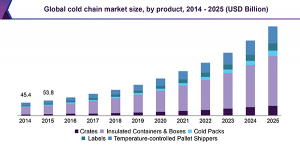OVERVIEW OF COLD CHAIN INDUSTRY OF INDONESIA 2019
Combined with hightened national political situation, these risks point to the increased vulnerability of the national manufacture to further shocks and greater probability of a stagnant growth in the first semester of 2019 – although still accelerate growth relatively in second semester.
Cold chain managers may face mixed blessings on the domestic demand, based on estimates about sustainable growth in the labor force and productivity. ARPI asesses the potential growth in the rental 3PL logistics based on its demand. This potential will impact to some national manufactures i.e: insulated panel, condensing-evaporator unit, refrigerated vehicle, and other equipments of cleaning room. ARPI predicts the cold chain industry will still grow avarage 3.7% within next year (becaused of 2-two digits for refrigerated vehicle). The industry acceleration will almost entirely due to a large dose of fiscal stimulus with tax cuts and spending increases put in place at second semester.
Agriculture and fisheries sector will drive a national income after consumers sector. These sectors that need good storages and good supply chain has made an interest for foreign company to invest. National logistics market still has a combination of shipping and international freight forwarders along with courier providers mainly engaged in land transportation and total logistics services providers that operate a multimodal transport model. That is why, refrigerated vehicle will grow in 2-two digits (predicted 13.4%). Express delivery market has witnessed a tremendous growth due to rising prominence of online shopping, increase an international cross border trade, shopping online for perishable items and elevated e-commerce industry.
Based on owing to the industrial parks situation, Jakarta, Bogor Depok, Tangerang and Bekasi (Jabodetabek) contributed highest revenue of warehouse and 3PL logistics, followed by Surabaya, Bali, Medan, Bitung and Makassar.
Local cold chain manufacture will increase low evenmore the contribution of e-commerce industry with rising population opting for online grocery and food delivery and also demand of the pharmaceutical industry increase. This will be a serious challenge to government that has to give a tax policy, product standardization and national labor skill competency.
Written by: Hasanuddin Yasni: Chairman of Cold Chain Association of Indonesia, Cold Chain Consultant and honorary lecturer in some private universities.

